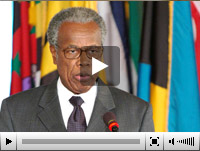- English
Cátedra de las Américas
Ninth Lecture - George Alleyne
Ninth Lecture - October 11, 2005
"A Conversation on the Inter-American Agenda"
Orador:
George Alleyne,
Director Emeritus of the Pan-American Health Organization
First, let me thank you for the opportunity to participate in this lecture series, and I feel honored to be following the distinguished persons who have addressed you in this forum. I believe that these addresses must be relevant to the work and mandates of the Organization of American State (OAS) and therefore I will try to put health of the American people in the context of those issues with which I think the modern OAS must deal.
I have taken the inauguration address of the Secretary General as a point of departure, as it gives a clear idea of his vision for the Organization and the mission it should embrace. He referred to the challenges for the Hemisphere as encompassing: “consolidating our democracies and strengthening democratic governance; protecting human rights; advancing the consensus that integral development is more than just economic growth and must also take into account the principles of inclusion and equity; and carving out a policy of multidimensional security that effectively addresses the main security problems affecting the people of the Hemisphere”. In his further elaboration of the concept of integral development, he pointed out that “progress in this sphere is unsustainable without objective dissemination of social rights, of high quality education and health, in short, the social and material conditions our citizen need to achieve their aspirations”.
The burden of this lecture is to demonstrate the role of health in the realization of the aspirations of our people in these various spheres that constitute genuine human development or as the Secretary General would say-integral development. The concept of what constitutes this development and the role of health in it has fascinated me for the past twenty-five years, and I have been influenced by the thinking of Caribbean scholars such as Sir Arthur Lewis on the true role of wealth in facilitating human choice and by Dr. Eric Williams who said simply that development is the face of man. But I have come to embrace the more recent concepts of Mabub Ul Haq and Amartya Sen in defining human development as the possibility of human beings expressing and fulfilling their capabilities. For that fulfillment, it was essential to focus on health, education, economic growth, a safe environment and a set of people freedoms that embraced such things as democracy and human security. These are all interrelated and for example, health is as much a driver as a consequence of economic growth and the people freedoms to which I referred. People value health. In the Millennium Poll which is one of, if not the largest public opinion poll ever conducted, health appeared as the thing that people valued most. It is not fortuitous that every aspirant to political office and every election manifesto make proposals for improving health.
But first, what is the state of health of the Americas? All the evidence shows that by the conventional measures of population health, there has been steady improvement over the years. In the past two decades, life expectancy at birth has increased by about five years and is now 70.4 years for men and 76.7 years for women. Our people are living longer and indeed the percentage of people over the age of 65 has increased steadily. Infant mortality rate which is a fairly good indicator of the basic public health services has fallen over that time by about half, and is now 20.1 deaths per 1000 live births. Malnutrition is no longer the problem it used to be. Female fertility is falling and the rate is now 2.3 children per woman. The Americas has been singularly successful in the control of the infectious diseases. The dreaded diseases of poliomyelitis and measles no longer pose problems and the childhood illnesses that are preventable by immunization are disappearing. The regional childhood vaccination days represent an example of international cooperation that is an envy of other parts of the world. Chagas disease which is seen only in our Region is slowly but surely coming under control.


